- Search forums
- Alternate History Discussion: Before 1900

WI: Muslims win the Battle of Tours?
- Thread starter ThePest179
- Start date Feb 19, 2015
- Feb 19, 2015
As it says in the title, what if the Franks lost the battle of Tours and the Muslims won instead? I apologize in advance if this has been asked many times before.
Not much When it comes to Islam in Europe not much, but this battle help the Carlogians rise to power so this may change the political order in Western Europe.
RadishPumpkinsForever
The Arabs were already at the extent of their supply lines. A victory would have probably just resulted in the official ceding of the various coastal French cities that were already controlled by the Arabs. This could have massive ripples. Trade between East and West would likely increase ones relations cooled down.
Escape Zeppelin
RadishPumpkinsForever said: The Arabs were already at the extent of their supply lines. A victory would have probably just resulted in the official ceding of the various coastal French cities that were already controlled by the Arabs. This could have massive ripples. Trade between East and West would likely increase ones relations cooled down. Click to expand...
Escape Zeppelin said: Maybe, maybe not. As you pointed out, at that distance the Muslim forces were pretty much spent. The Franks can lose the battle but still win the war. Unless the Muslim forces crush the Franks I think another battle would be fought within a few years still leaving the Franks the victor just on a slightly delayed timescale. Click to expand...
Depends on degree of victory. If Martel is killed and army is routed then consequences can be drastic.
The Umayaads already had their hands full in keeping an eye on the remaining Christian kingdoms in the Iberian peninsula and the raid at Tours was at the long end of their supply chain. Even if Martel is killed and his army dispersed there isn't much that can be exploited from that beyond more loot. The greater impact is on Frankish internal politics with the removal of the Carolingians from the picture before they begin their long rise.
More loot for the Muslims But possibly it could lead to the muslims later being able to push further into Western Europe, because the Carolingians will be less powerful leading to massive butteflies
- Mar 27, 2015
- Mar 28, 2015
that year i doubt much would change, but it may make the Arabs more likely to have the army size raidings then the smaller size raiding they did OTL, long run maybe a weaker Aquataine but not much.
Ameck16 said: When it comes to Islam in Europe not much, but this battle help the Carlogians rise to power so this may change the political order in Western Europe. Click to expand...
- Mar 30, 2015
Barbarossa Rotbart
ThePest179 said: As it says in the title, what if the Franks lost the battle of Tours and the Muslims won instead? Click to expand...
Youngmarshall
Barbarossa Rotbart said: Nothing would have happened, because that was not an invasion but a raid. they did not plan to stay they only wanted to plunder. Thus if they had won at Tours and Poitiers they would have returned to Spain with rich plunder and would have returned for more some years later. And then the Franks could have stopped them. But it could have stopped the career of Charles Martel. Click to expand...
Caesar Biden
I don't think it would have been as inconsequential as many here seem to imply. Would the Muslims have conquered anything in that particular raid? Probably not. As we've said, they had bigger problems to worry about, like continuing to get supplies or holding down Spain. But there could be an impact. Who's to say Muslims wouldn't be conquering next time around? Or the next time? The momentum would still be on their side, and there would no Carolingians to unite behind (there could be some other dynasty, but there also could not). A big part of history is how people of the time perceived themselves and the people around them, and the Battle of Tours changed many of those perceptions.
ThePest179 said: As it says in the title, what if the Franks lost the battle of Tours and the Muslims won instead? I apologize in advance if this has been asked many times before. Click to expand...

Battle of Tours (The Battle of Tours)
- View history
The Battle of Tours , also called the Battle of Poitiers and the Battle of the Highway of the Martyrs , was fought on 10 October 732, and was one of the most important battles in human history. It was part of the Umayyad invasion of Gaul. It resulted in a victory by the Umayyads under Abdul Rahman Al Ghafiqi, the Governor-General of al-Andalus, over the Frankish and Aquitainian forces under Charles Martel.

The Battle of Tours - A Decisive Fight for Europe’s Future
- Read Later
The early medieval world of our ancestors was built upon struggles and decisive battles. The emerging nations united the broken tribes, expanded their borders, conquered their enemies, and often enough - fended off invaders. But rare are the battles that really left a long lasting impact that echoed through the generations that followed.
Rare are such conflicts that changed the history of the world with their importance and decided the future of us all for centuries to come. And one of those rare, world-changing battles is the Battle of Tours - fought in 732 AD between the Christian Frankish forces and the invading Muslim Umayyad Caliphate.
This fierce and destructive conflict, that shaped the future of Europe and echoed through time, was a great gamble, fought against all odds. But it remains as one of the biggest lessons of Europe’s past, and today we are going in detail about that fated day in 732.
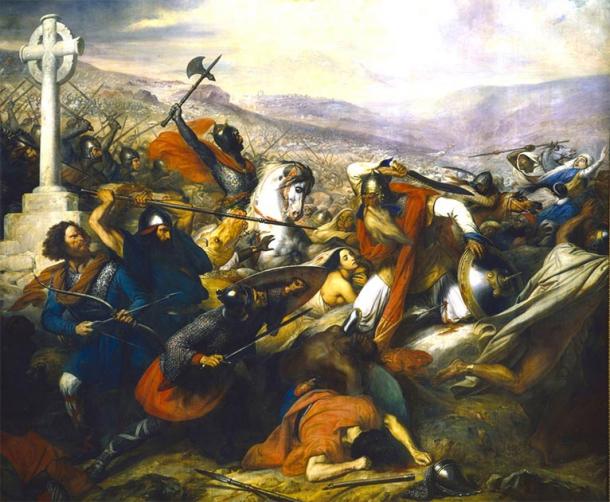
A triumphant Charles Martel (mounted) faces Abdul Rahman Al Ghafiqi (right) at the Battle of Tours. Source: Bender235 / Public Domain .
The Prelude to the Battle of Tours
Around the very beginning of the 8 th century, in the year 700 AD, the Muslim Umayyad Caliphate was rapidly spreading its empire around the world. It was the second of the four great caliphates that emerged after the death of Muhammad and was one of the largest empires of the world at the time.
After conquering the lands of North Africa, they saw mainland Europe as the next prey for their conquests. From the shores of North Africa, they had a clear passage - in the form of the Gibraltar Strait. This would allow their forces to cross over onto the Iberian Peninsula , from which they would spread further inland.
At the time, Iberia was under the control of the Visigothic Kingdom, a centralized state under the rule of King Roderic. Nonetheless, the Umayyads crossed the strait in the year 711 AD, under the leadership of one Tariq ibn Ziyad, and soon after clashed with the Visigothic army in the Battle of Guadalete, in the same year, in the very south of Iberia.
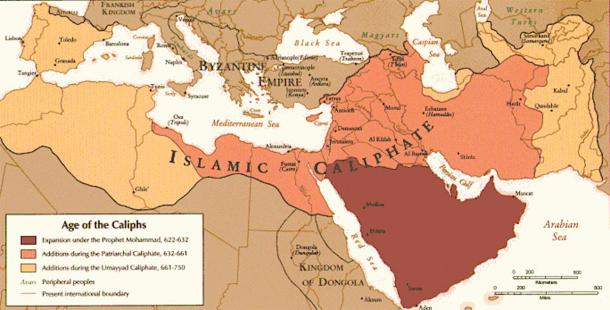
The "Age of the Caliphs", shows the Umayyad dominance stretched from the Middle East to the Iberian Peninsula, including the port of Narbonne, c. 720. (McZusatz / Public Domain )
At the time of the Umayyad invasion, King Roderic was far in the north, attempting to fight a Basque rebellion. This unfortunately placed him in a bad situation, as he was forced to a long march south, to face this much bigger enemy. In the end, the Visigoths were defeated in the face of the overwhelming Muslim cavalry.
In the battle, King Roderic and most of the nobles of his kingdom lost their lives, which allowed the Umayyads to effectively conquer Iberia, step by step. This they managed in just a little under seven years. And once Iberia was theirs, Frankish Gaul was just a step away.
The only thing that divided the Umayyads from their prey - the Frankish Kingdom - were the Pyrenees Mountains . This was a fitting natural barrier - but it was in no way untraversable. In time, the Umayyads began crossing over and making incursions into the very south of Gaul. By 720 they conquered the southern province of Septimania.
In the following year, they focused on the large city to the immediate west, Toulouse, which they besieged. This siege was brought to an end by the prominent Frankish Duke Odo - who managed to overwhelm the Umayyad forces outside Toulouse and defeat them. Nonetheless, large numbers of Umayyads kept crossing over the Pyrenees and laying waste to the southern provinces of Gaul.
The Duchy of Aquitaine laid in the south and faced the brunt of this invasion. Its largest towns, Bordeaux and Toulouse were ravaged, and in no time the invaders reached even the Duchy of Burgundy to its north.
But it wasn’t until 732 that the Umayyad Caliphate truly amassed its forces with proper conquering intentions and adequate strength. The man that was at the head of this force was Abdul Rahman al Ghafiqi, the then-Governor General of Muslim Iberia. He led his forces across the Pyrenees once again and plundered the land and all the cities he came across.
- Unique Iberian Male DNA was Practically Wiped Out by Immigrant Farmers 4500 Years Ago [New Study]
- Raiders of Hispania: Unravelling the Secrets of the Suebi
- Was the First Islamic Siege of Constantinople (674 – 678 AD) a Historical Misnomer?
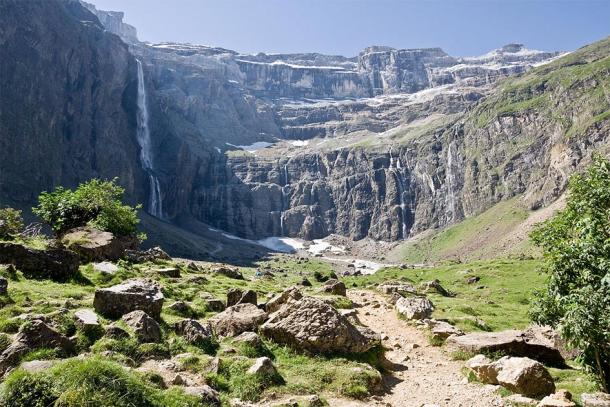
Abdul Rahman al Ghafiqi led his troops over the Pyrenees Mountains toward the Battle of Tours. (Jean-Christophe BENOIST / CC BY-SA 3.0 )
The Umayyads greatly coveted riches, and their main activity during this conquest was plunder. After completely ransacking Bordeaux once again, the Umayyad forces faced Duke Odo once more. Odo led his army in an attempt to stop the invasion as he did a few years before.
But this time, he was terribly outnumbered and outmaneuvered, and his forces were crushed. Realizing the gravity of the situation, and that his own lands of Aquitaine were overrun, Odo fled to the north seeking assistance from the de-facto ruler of the Frankish Kingdom - Charles Martel.
Before the Umayyad invasion Odo and Charles were enemies. Charles sought to expand his lordship over Aquitaine and Odo saw the Franks as invaders. But with this new and much greater threat, Odo had no choice but to seek help from the Franks. Charles Martel agreed to join up with him, but the “price” was Odo’s acceptance of Frankish overlordship. Odo agreed.
The Hammer Enters the Fray
Charles Martel was a seasoned ruler and a battle hardened veteran. His troops were equally experienced having been in constant clashes along the eastern borders of their kingdom, fighting neighboring tribes.
Charles also understood how important the situation was and began gathering his levies from all over the north. And he would show his shrewdness as a battle commander, when he carefully understood the intentions of his enemy.
Meanwhile, the Umayyad forces moved slowly across the Frankish lands, their forces spread into war parties that ravaged the countryside and amassed an enormous amount of plunder. This “greedy” focus on war booty would greatly influence their future undoing. They had to take their time, as they greatly depended on the crop season for their food source.
But their destination was clear to Charles Martel. It was the rich city of Tours - prominent and wealthy, filled with abbeys of great importance. Thus, Charles placed his Frankish forces directly on the path of the coming Umayyads. He situated his army roughly in between the city of Tours and the ravaged town of Poitiers further south.
The Franks were placed close to the confluence of rivers Clain and Vienne, on a slightly elevated and forested hill. Charles Martel deliberately and shrewdly chose this position. First of all - he was outnumbered and knew it.
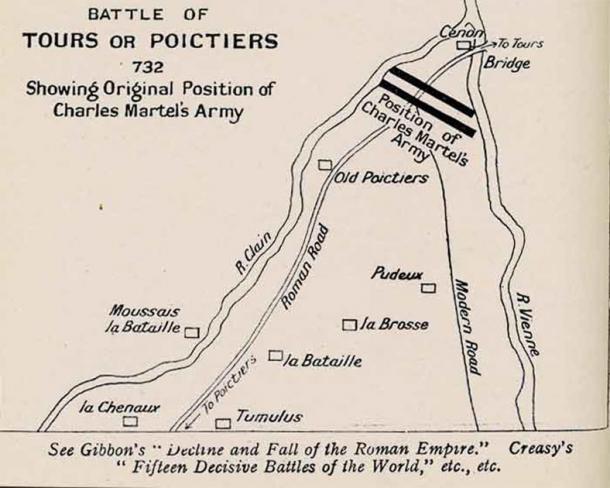
Map of the Battle of Tours with the position of Charles Martel's army. (Evzen M / Public Domain )
Thus he chose the cover of the forest to displace his troops and hide his number in hope to not reveal his disadvantage. Secondly - he chose a place where the Umayyads would have to enter into battle, as the only crossing over the rivers was behind the Frankish forces. Thirdly - the forest protected his troops - mainly the second lines - from the full brunt of a cavalry charge, and somewhat protected his sides from flanking attacks.
When the Umayyads approached the assembled Christian army, their leader Abdul Rahman al Ghafiqi - also a seasoned commander - knew that Charles Martel took the upper hand, by choosing his preferred place of battle. Even so, al Ghafiqi trusted in his strength and deployed for battle.
One thing he must have noticed is the difference in the troops - Umayyads relied heavily on cavalry, while the Franks were mostly footmen. But he failed to take several things into account.
The Muslim cavalry was lightly armored - they preferred to adorn themselves with chainmail and not much else in terms of armor. Riches and trinkets were much more to their liking.
They also rode willful Arabic horses, which were difficult to break in, and thus not the truly perfect cavalry mounts. Some historians also mention that this cavalry was in large part armed with spears - which were unseasoned and would break on first impact.
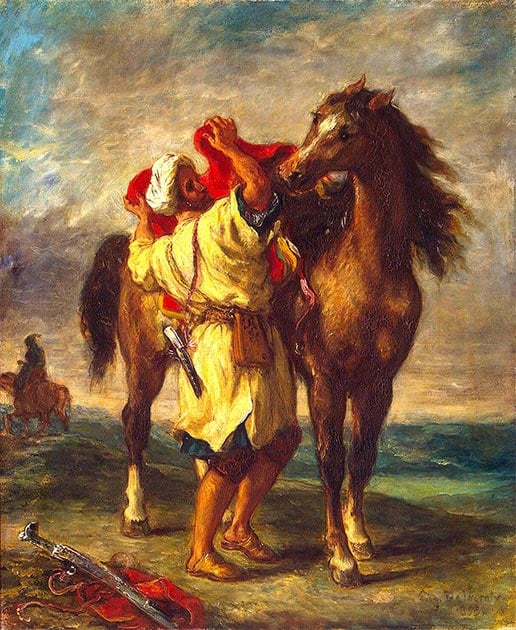
The Muslim cavalry rode willful Arabic horses during the Battle of Tours. (Trzęsacz / Public Domain )
On the other hand, the Frankish infantry was thoroughly seasoned. Most of the army were veterans, with only a small part of fresh recruits reserved in the second lines. They were well armored for the time, and well-armed as well. They stood packed in tight lines and ready for a cavalry charge.
But the battle did not begin immediately. The opposing forces “tested the waters”, with sporadic small skirmishes going on for seven days.
This was in truth a deliberate stalling from al Ghafiqi, who waited for his whole army to assemble fully. In the end, with the Umayyads fearing the approaching winter, they commenced battle on the seventh day - on the 10th of October 732 AD.
The Umayyad Wave That Broke On the Frankish Rock
The Umayyad commander, al Ghafiqi, heavily relied on his cavalry, even though he didn’t possess much knowledge about the assembled enemy. He sent waves of cavalry charges in an attempt to break the Frankish lines - but this did not happen. The seasoned Franks were tightly packed - shoulder to shoulder - and withstood all assaults.
The rare combination of slight elevation, good arms and armor, and tree cover allowed them to hold their ground - when it was almost impossible for infantry to hold against cavalry in medieval times. Even when some small parts of the line faltered and broke under the cavalry, the fresh second lines were quick to react - sealing the gap.
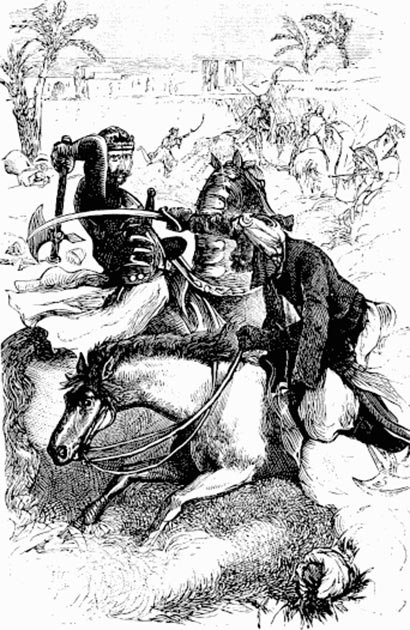
Frankish knight fighting against an Umayyad horseman. (Helix84 / Public Domain )
As the battle went on in that way, Duke Odo commenced a crucial flanking operation that greatly tipped the scales in Frankish favor. He gathered a cavalry force and flanked wide - reaching the distant Muslim encampment - i.e. their rear. This was where the Umayyad tents were and all of their abundant plunder.
Odo managed to inflict great losses here, retrieve the precious plunder, free around 200 captive Franks, and draw the eye of the enemy. But what happened next was more than he hoped for. Upon realizing that their camp and their plunder were under attack, many Umayyad units from the central battlefield rushed back in a frenzy to save their loot.
This was an unprecedented situation, one that al Ghafiqi never expected. His attempts at rallying his troops were in vain, and Charles Martel - who knew exactly what he was doing - seized this opportunity.
As the Umayyad forces dissipated to retrieve the loot, he swung his forces from left, right, and center, and engaged in both pursuit and encirclement. The remaining body of the Umayyads was surrounded and suffered immense casualties.
The chief of these was al Ghafiqi himself - who fell in battle while attempting to rally his troops. Meanwhile, Duke Odo swung north again and cut off the fleeing Umayyads, inflicting great losses. In effect, the Umayyad forces fled.
- The Heroic Story of Roland: A Valiant Knight With an Unbreakable Sword
- Cataphracts: Armored Warriors and their Horses of War
- The Mighty Magyars, a Medieval Menace to the Holy Roman Empire
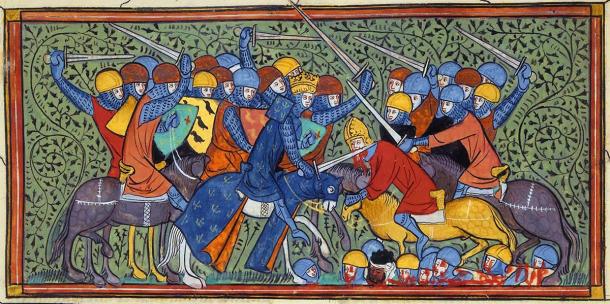
Charles Martel gathered his cavalry at Battle of Tours and attacked the Umayyad encampment. (Levan Ramishvili / Public Domain )
Now, Charles Martel expected a second day of battles and remained in his position, treating the wounded and re-organizing. But another day never came. The Umayyads, with their commander dead, could not successfully organize another attack or choose a fitting leader. They had suffered great losses as well.
Charles Martel feared an ambush and would not descend from the hill at any cost. Eventually, he sent out extensive reconnaissance parties to survey the Umayyad forces - but only to learn that there were none. They had gathered all the remaining plunder they could and fled during the night - extremely hastily. They had returned to Iberia.
Charles Martel won a crushing and glorious victory that cemented his reputation of a noble and capable leader. He was praised all across Europe as the savior of the Christendom and the “Hammer that Broke the Muslims”. Thus he earned his nickname - Martel - meaning Charles the Hammer.
He subsequently expanded his rule over Aquitaine and successfully isolated the invaders to the southern region of Septimania, where they remained for another 27 years and were completely unable to break through. Charles’ wealth, influence, power, and ability led to the emergence of the Carolingian dynasty , which would rise and last for centuries to follow.
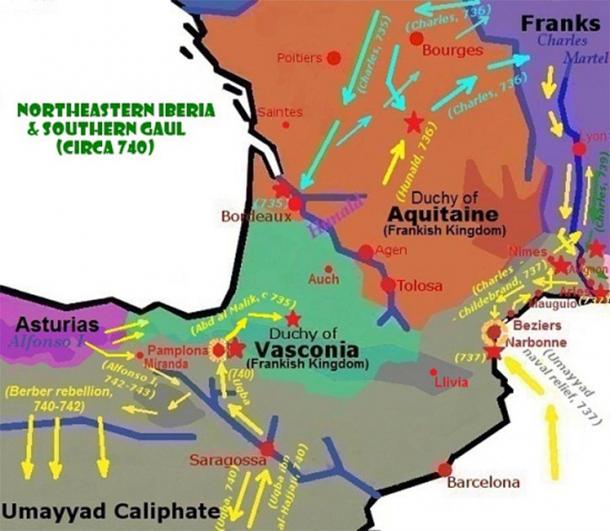
Charles Martel's military campaigns in Aquitaine, Septimania, and Provence after the Battle of Tour-Poitiers (734–742). (Iñaki LLM / CC BY-SA 3.0 )
Changing the Future of the World
The Europe of the early 18 th century desperately needed a capable and strong commander that would stop the Muslim Umayyad invaders dead in their tracks. And that commander was Charles Martel. He stood up to ravaging flood of conquerors and using his superior tactics, shrewdness, and reputation, he managed to win a crushing battle - against all odds. Like a beacon that kept burning throughout a storm, his Frankish warriors defied their enemy in battle. And it is this battle that changed the course of European history, and with that - the history of the World.
Top image: Medieval soldier at war. Credit: Andrey Kiselev / Adobe Stock
By Aleksa Vučković
Creasy, E. 2016. The Fifteen Decisive Battles of the World . Enhanced Media.
Neiberg, M. 2003. Warfare in World History . Taylor & Francis.
Scott, J. 2011. Battle of Tours - A New Look at an Old Enemy . eBookIt.

I am a published author of over ten historical fiction novels, and I specialize in Slavic linguistics. Always pursuing my passions for writing, history and literature, I strive to deliver a thrilling and captivating read that touches upon history's most... Read More
Related Articles on Ancient-Origins

Sign Up Today
Start your 14 day free trial today
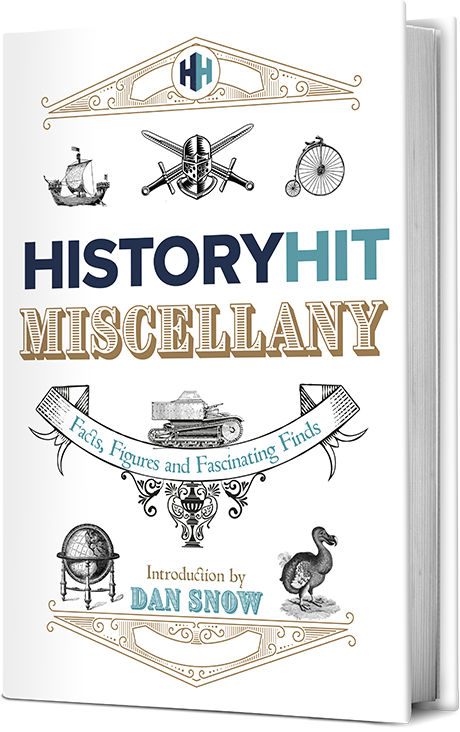
The History Hit Miscellany of Facts, Figures and Fascinating Finds
Battle of Tours: Its Significance and Historical Implications

Celeste Neill
01 oct 2018.
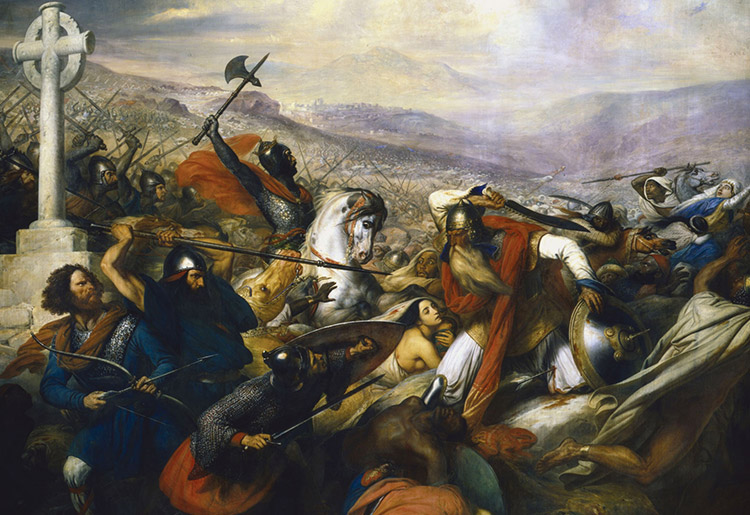
On 10 October 732 Frankish General Charles Martel crushed an invading Muslim army at Tours in France , decisively halting the Islamic advance into Europe.
The Islamic advance
After the death of the Prophet Muhammed in 632 AD the speed of the spread of Islam was extraordinary, and by 711 Islamic armies were poised to invade Spain from North Africa. Defeating the Visigothic kingdom of Spain was a prelude to increasing raids into Gaul, or modern France, and in 725 Islamic armies reached as far north as the Vosgues mountains near the modern border with Germany .
Opposing them was the Merovingian Frankish kingdom , perhaps the foremost power in western Europe. However given the seemingly unstoppable nature of the Islamic advance into the lands of the old Roman Empire further Christian defeats seemed almost inevitable.
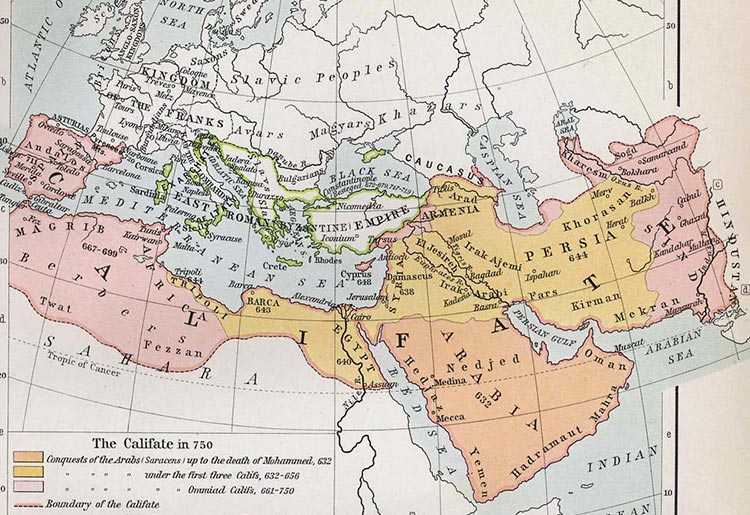
Map of the Umayyad Caliphate in 750 AD. Image credit: Public Domain, via Wikimedia Commons
In 731 Abd al-Rahman, a Muslim warlord north of the Pyrenees who answered to his distant Sultan in Damascus, received reinforcements from North Africa. The Muslims were preparing for a major campaign into Gaul.
The campaign commenced with an invasion of the southern kingdom of Aquitaine, and after defeating the Aquitanians in battle Abd al-Rahman’s army burned their capital of Bordeaux in June 732. The defeated Aquitanian ruler Eudes fled north to the Frankish kingdom with the remnants of his forces in order to plead for help from a fellow Christian, but old enemy: Charles Martel .
Martel’s name meant “the hammer” and he had already many successful campaigns in the name of his lord Thierry IV, mainly against other Christians such as the unfortunate Eudes, who he met somewhere near Paris . Following this meeting Martel ordered a ban , or general summons, as he prepared the Franks for war.
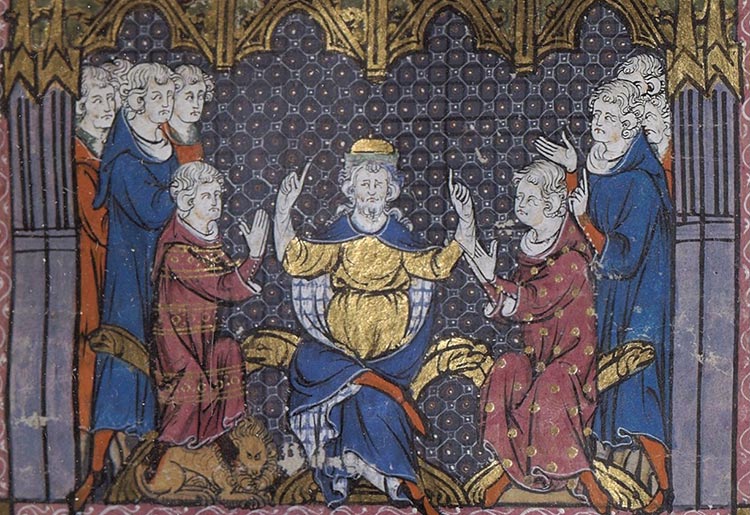
14th century depiction of Charles Martel (middle). Image credit: Public Domain, via Wikimedia Commons
The Battle of Tours
Once his army had gathered, he marched to the fortified city of Tours, on the border with Aquitaine, to await the Muslim advance. After three months of pillaging Aquitaine, al-Rahman obliged.
His army outnumbered that of Martel but the Frank had a solid core of experienced armoured heavy infantry who he could rely upon to withstand a Muslim cavalry charge.
With both armies unwilling to enter the bloody business of a Medieval battle but the Muslims desperate to pillage the rich cathedral outside the walls of Tours, an uneasy standoff prevailed for seven days before the battle finally began. With winter coming al-Rahman knew that he had to attack.
The battle began with thundering cavalry charges from Rahman’s army but, unusually for a Medieval battle, Martel’s excellent infantry weathered the onslaught and retained their formation. Meanwhile, Prince Eudes’ Aquitanian cavalry used superior local knowledge to outflank the Muslim armies and attack their camp from the rear.
Christian sources then claim that this caused many Muslim soldiers to panic and attempt to flee to save their loot from the campaign. This trickle became a full retreat, and the sources of both sides confirm that al-Rahman died fighting bravely whilst trying to rally his men in the fortified camp.
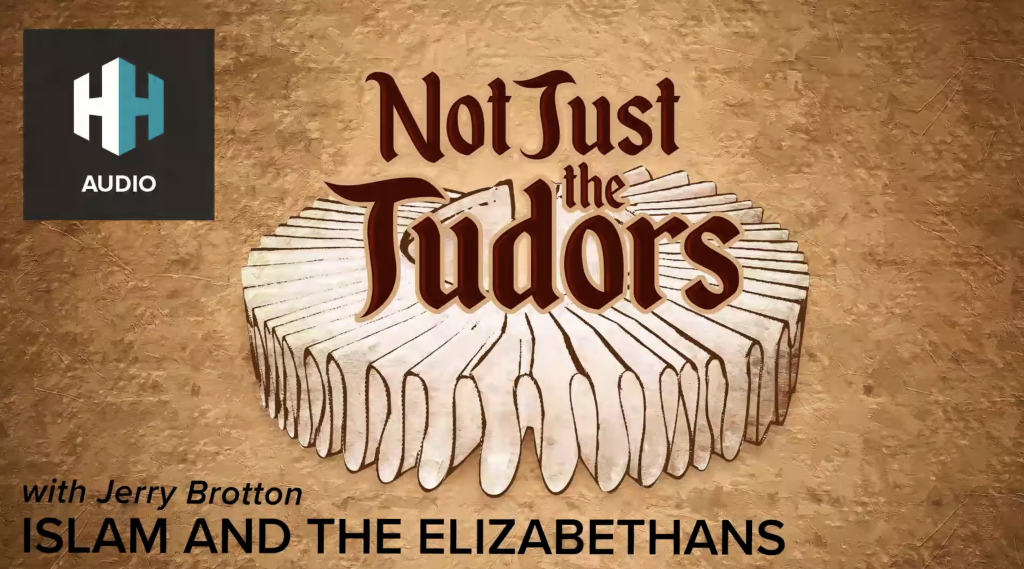
The battle then ceased for the night, but with much of the Muslim army still at large Martel was cautious about a possible feigned retreat to lure him out into being smashed by the Islamic cavalry. However, searching the hastily abandoned camp and surrounding area revealed that the Muslims had fled south with their loot. The Franks had won.
Despite the deaths of al-Rahman and an estimated 25,000 others at Tours, this war was not over. A second equally dangerous raid into Gaul in 735 took four years to repulse, and the reconquest of Christian territories beyond the Pyrenees would not begin until the reign of Martel’s celebrated grandson Charlemagne.
Martel would later found the famous Carolingian dynasty in Frankia, which would one day extend to most of western Europe and spread Christianity into the east.
Tours was a hugely important moment in the history of Europe, for though the battle of itself was perhaps not as seismic as some have claimed, it stemmed the tide of Islamic advance and showed the European heirs of Rome that these foreign invaders could be defeated.
You May Also Like
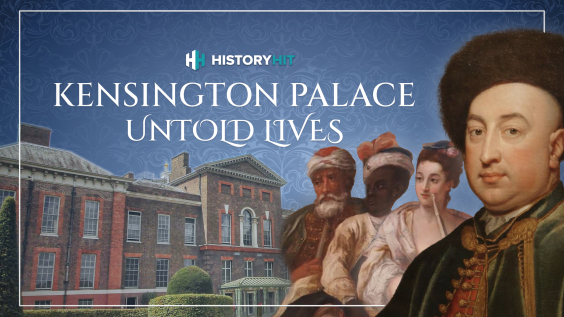
Mac and Cheese in 1736? The Stories of Kensington Palace’s Servants
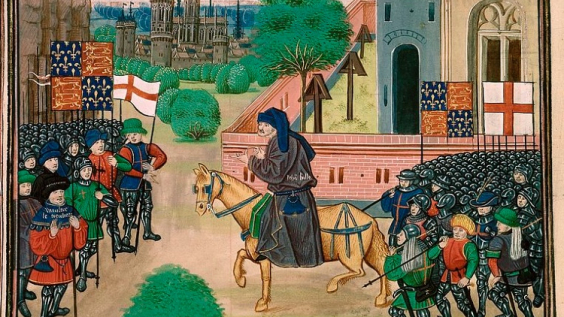
The Peasants’ Revolt: Rise of the Rebels
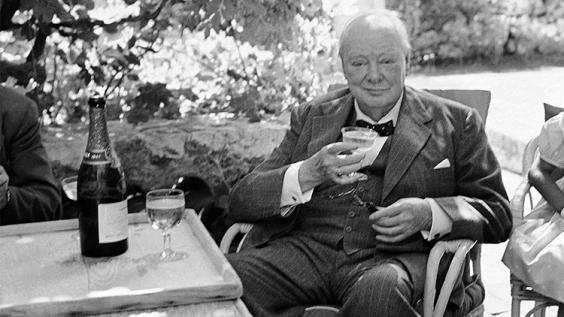
10 Myths About Winston Churchill
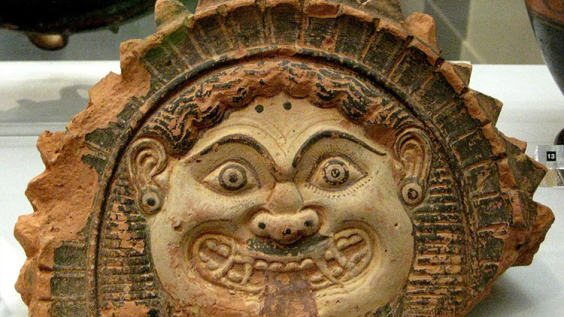
Medusa: What Was a Gorgon?
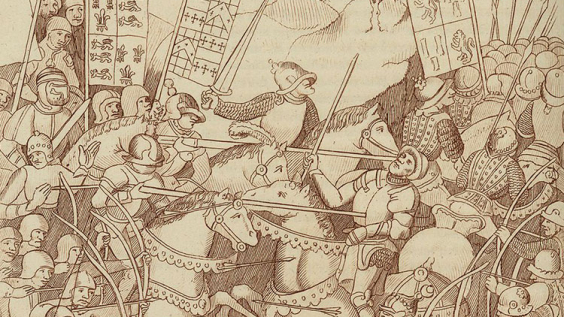
10 Facts About the Battle of Shrewsbury
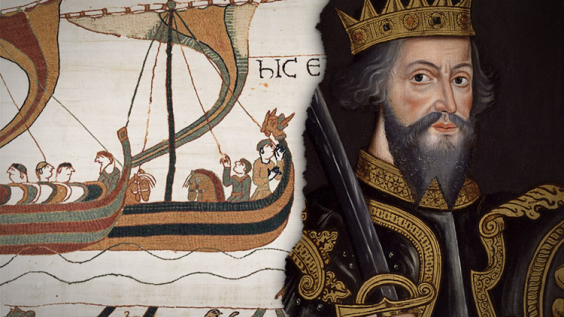

5 of Our Top Podcasts About the Norman Conquest of 1066
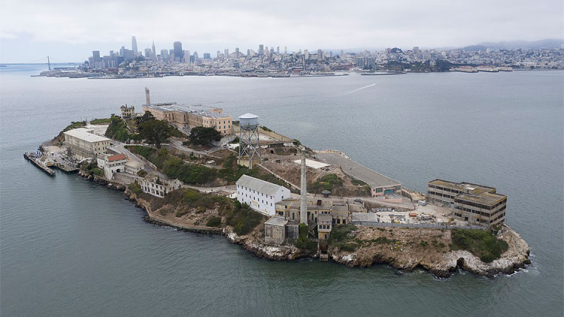
How Did 3 People Seemingly Escape From Alcatraz?
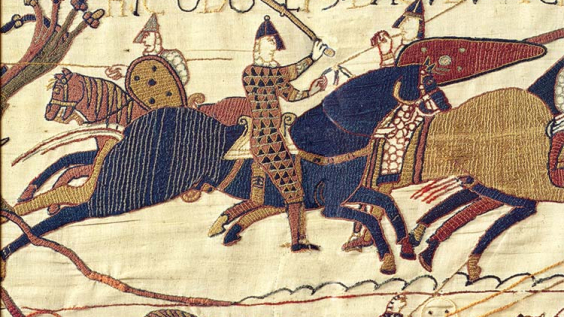
5 of Our Top Documentaries About the Norman Conquest of 1066
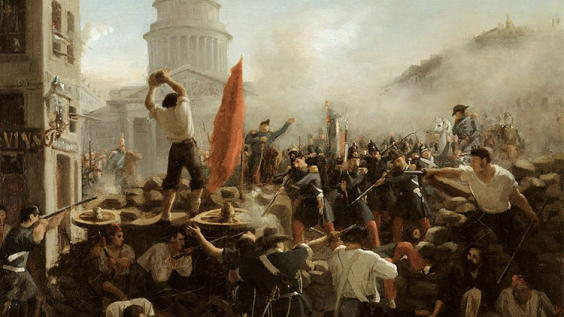
1848: The Year of Revolutions
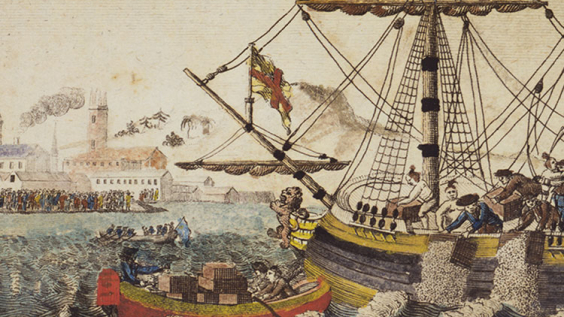
What Prompted the Boston Tea Party?
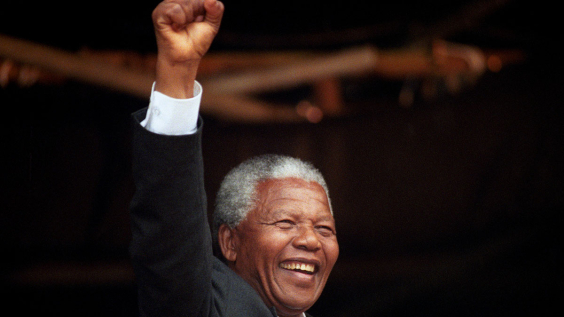
15 Quotes by Nelson Mandela

The History of Advent
The Battle of Tours - 732 AD fr de , en ,
Charles Martel was a ruler of the Carolingian Frankish Empire in the early 8 th century AD. The empire encompassed the territories of much of modern day France, western Germany, Switzerland, as well as Belgium and the Netherlands, and was the dominant Christian power in Western Europe at the time. Having won a civil war between two competing kingdoms in 724, Charles had secured his position as head ruler of the entire Carolingian Empire, but had not yet been granted the title of King.
Although he was constantly repelling Saxon and Bavarian armies, as well as other threats, the empire was for the most part secure. Charles supported St. Boniface and other missionaries in their efforts to convert all remaining German tribes to Christianity as a way of uniting his region. The European continent was slowly becoming more prosperous and stable. But a new threat had begun working its way towards the heart of Western Civilization 100 years prior to Charles’ rule.
Islam Expanding
In the Middle East, the religion of Islam was formed in 622 AD. The region was quickly united under the new religion and then began to conquer more distant lands. By 711 Islamic armies had crossed the Gibraltar Straight and entered into Europe by way of present day Spain. It was from here that they began to set up new kingdoms and seek to conquer other parts of Europe, primarily for plunder of any type of treasure they could find.
The indigenous peoples of Europe referred to the Islamic invaders as the Saracens. From Spain the door stood wide open for the Saracens to enter into France, the conquest of which would have likely been followed by all the rest of Europe, and might have resulted in the banishment of Christianity from the Earth. At this time Christianity was not universally known or practiced, even by those nations which we today regard as the foremost in civilization. Great parts of Britain, Germany, Denmark, and Russia were still pagan and barbarous.
In 712 the Saracens entered into France and began pillaging the region for treasure. In 725 Anbessa, the Saracen governor of Spain, personally leads an army across the Pyrenees Mountains into France and takes the strongly fortified town of Carcassone. During the battle he receives a fatal wound, and the Saracen army retires into the nearby town of Narbonne before retreating back to the safety of Spain.
In 732 the Saracens invade France again under the command of Emir Abdul Rahman Al Ghafiqi Abd al Rahman. They reach Bordeaux and begin to lay siege to the town when they get word of rich treasures in the Basilica of St. Martin in the city of Tours. They set off towards this area with the intent to plunder it for all it's worth.
Up to this point, the Carolingian Empire, ruled by King Charles, had no need to oppose the Saracens since they had not invaded any of his territories. The area of the Saracens plunder had been Aquitaine, an independent kingdom in southwestern France ruled by King Eude. Having learned of the damage being done to his neighboring kingdom, Charles becomes convinced of the danger presented to his territories. If Aquitaine were to be defeated, his kingdom would surely be next. Charles begins to march an army towards the Saracen invaders to confront them on his own terms.
While Abd al Rahman is advancing towards Tours, he receives intelligence regarding the advance of Charles and his army. He decides to fall back on Poitiers in order to occupy a more advantageous field of battle. Charles, leading an army of such size rarely seen in Europe, crosses the Loire River and joins the remains of the army of Aquitaine.
They come in sight of the Arabs on October 10 th , 732. The enemy spots Charles and his army and at first hesitates. The two armies remain camped, staring each other down, for seven days. Abd al Rahman at last gives the signal to attack. The Saracens rush the Franks with all their might but the Frankish front line holds. The battle rages on until late in the day, when a terrible clamor is heard from behind the Saracen army. It is King Eude, attacking the Saracen camp, stealing all of their ill-gotten plunder. The Saracen army frantically rushes back to protect their possessions.
In this moment of confusion the Franks advance. Abd al Rahman is killed in the chaos. The Saracens regain control of their camp. By this time the sun is beginning to set, and Charles decides to wait until the next day to resume combat, not wanting to risk losing any more troops at night.
The next morning the Franks awake early and assemble their army, expecting to rejoin battle with their enemy. They wait, but no enemy appears. They cautiously approach the Saracen camp and find it completely empty. The Saracens had taken advantage of the night and begun their retreat back towards Spain, leaving most of their plunder behind. As the battlefield was surveyed that day, it was realized that a vast number of Saracen men had been slain. The Franks counted their losses and found that only 1500 of their men had been killed.
Charles is finally proclaimed King of the Carolingian Empire, and for his enormous victory he receives the surname of Martel, "The Hammer". He would later become the grandfather of Charlemagne. The Carolingian Empire becomes the Holy Roman Empire, with Charlemagne proclaimed Emperor by the Pope on Christmas Day, 800 AD. This empire survives for over 1000 years until it is formally dissolved in 1806.
The battle of Tours marks a major turning point in the history of Western Civilization. One where the spread of Islam into Europe was reversed, and Christianity begins to give the people of Europe something more in common with each other. By the year 1000 AD, the continent would be doing fairly well. It would be generally free from foreign attack and steadily creating a more prosperous future.
Do not assume that I have come to bring peace to the earth; I have not come to bring peace, but a sword. Matthew 10:34
« Previous Post
Johannes Kepler
Next Post »
Sign up for email updates .
Welcome new readers!
In a hope to share any interesting historical stories I come across in the future I will be writing and posting articles whenever I can. Hopefully quite often.
I'll also be keeping you up to date on any good reads I come across in the Recommended section.
Looking for something in particular? Find it more quickly on the Search page.
And here is a complete list of all articles since the beginning.
Recent Articles
The Battle of Lepanto - 1571 God Rest You Merry Gentlemen The Druids The Gartan Mother's Lullaby Earth's Axial Precession Bronze Age Civilization Collapse Winterfylleth (Ƿinterfylleþ) David Livingstone Jettying - Unique Architectural Style Good King Wenceslas The Christmas Star Captain Henry Morgan Indo-European Migration The Siege of Paris - 1870 European Forests
"It is possible to believe that all the past is but the beginning of a beginning, and that all that is and has been is but the twilight of the dawn."
~ H.G. Wells
The Discovery of the Future
Personal Blog | Recipes | Donate
Content copyright 2014-2024 - www.classichistory.net - All rights reserved | Disclaimer
You May Also Like:
Dona Nobis Pacem
Western Civilization prior to World War I
The Ever Increasing Size of the Known Universe
Romantic - The History of a Word
73 - 209 - Thanks for the detailed story of the Battle of Lepanto… as a dedicated lover-of-Venice, I have seen the paintings in the Doges Palace and knew of its significance. Here are the details. As noted, this ranks w/the defense of Vienna in 1683(?); check,as well, the legendary defense of Malta sometime in the late 1400’s; as deep as it gets.
71 - 187 - Thank you so much for this.
71 - 189 - You're welcome. Thank you for reading.
71 - 204 - Too kind :) Thanks for reading Karen.
71 - 203 - Wonderful precise information, Thanks so much !
71 - 217 - Thanks for sharing inspiring rare history on Druids. Even I'm Indonesian..don't know why I like to.learn on old European belief systems such as paganism & druids :)
69 - 177 - Sorry, but I do wish people who write articles mentioning astrology would go to the trouble of actually learning about astrology. The zodiac has nothing whatsoever to do with constellations, apart from the Greeks giving names to the signs from some of the constellations at that time. The zodiac was designed by ancient Babylonians, based on their calendar of 12 (and occasionally 13) lunar months, with 12 equal signs fixed to the March equinox. It has always been about the signs. The Western Tropical Zodiac will always begin with 0 degrees Aries on the March equinox and the stars have no relevance to this at all. The precession of the equinoxes and the alleged astrological ages are a minor oddity which astrologers generally have very little interest in.
69 - 186 - If the stars have no relevance to astrology, what relevance do the planets have? Are the positions of the planets determined in relation to the “signs” as given by astrology, or are their positions determined in relation to their apparent positions relative to the ecliptic and the stars visible in that celestial band.? If we’re to disregard the apparent positions of the stars, why bother to observe the positions of the planets, either?
69 - 199 - This article is about precession, which is obviously tangential to astrology, but the article never mentions the word. I'm not sure what you're going on about. The subject matter, especially in reference to constellations, is absolutely appropriate, as the ancients clearly were concerned about the positions of stars and planets, to think otherwise is absurd. The Egyptians understood the ages beginning and ending with certain star positions, whoever built the lion sphinx statue aimed it at Leo (the Lion CONSTELLATION), which tells us that it was likely built during that zodiacal age. I'm not sure how you can disregard the obvious tie-ins to key moments in history with what's marked out in the sky via constellations.
69 - 218 - Very understandable article , just what I was looking for as I have no background in astronomy. Thanks for your efforts.
66 - 176 - Truly David Livingstone was a greatest missionary and explorer in Africa no one else other than him from Europe has left such a record. He will always be remembered for his great work in Africa.
64 - 128 - Wonderful story. Excellent history. Great Christmas Song too! Especially Luke 6:38
64 - 130 - I enjoyed playing piano recitals of Good King Wenceslas as a child - for the old folks in the nursing homes in our town. Thank you for the history on this beloved King.
64 - 135 - Thank you Teresa for your kindness to the elderly. Nursing homes are filled with lonely souls who sincerely appreciate such acts of generosity.
64 - 210 - I’ve played this for years! even posted a recording on YouTube under “Safe Sax Trio” from December 2020. it has a special connotation as Mi amor,Blanka, is Czech, born and grew up in Prague,Bohemia…St.Wenceslas being the patron Saint of the Czech People.????
61 - 95 - h
60 - 125 - "The Indo-Europeans were a people group originating in the plains of Eastern Europe, north of the Baltic and Caspian Seas in present day Ukraine and southern Russia." Surely you meant the Black sea and not the Baltic....
60 - 126 - Ha, yes I meant the Black Sea. Thanks Pgolay.
56 - 83 - Wild temperature swings throughout the years!
56 - 84 - Indeed! All the more reason to be thankful for the forests we are enjoying today.
55 - 137 - Interesting article! I'm curious, what were the sources about Hippocrates and his communications with Athens and Persia in regard to the plague?
55 - 138 - Thank you! Hippocrates' own writings on this subject have been translated into English. Wesley D. Smith has some good modern English translations: https://www.amazon.com/exec/obidos/ASIN/0674995260 Artaxerxes sends a letter to Hippocrates begging for help: "the renown of whose techne has reached even to me, as much gold as he wants, and anything else that he lacks in abundance, and send him to me" Hippocrates replies: "Tell the King I have sufficient food, clothing, and shelter, and all the necessities that I require for life, and that I have no wish for Persian wealth or to save foreigners from disease, since they are enemies of the Greeks."
55 - 145 - I really like Athens because it is truly a unique place with a rich history and unique distinctive features. Of course, there are a great deal of reasons to fall in love with this city because it’s a true calling card of Greece. After reading your article, I became more convinced that it is an incredible city in which ancient traditions and modernity harmoniously intertwine with each other into a single whole. It is so cool that you mentioned the Temple of Poseidon because I think that it’s such a wonderful way to delve into the history of Athens and feel the atmosphere of ancient times. I think that Athens is the best city in Greece for wine connoisseurs because it seems to me that you can try delicious and rare Greek wines there, getting unforgettable impressions. Art and culture in Athens are so incredible and multifaceted that it can’t leave you indifferent. It is an indisputable fact that the halls of the Museum of Cycladic Art are impressive in their scope and they have very interesting interactive expositions. It is so cool that there are so many incredible things and I think you will always find something to look at.
43 - 14 - Interesting article. An enjoyable read. Thanks
43 - 15 - Glad you enjoyed it!
40 - 149 - I was wondering where that cross at the top of the page is located? It is quite impressive and I stare at it a great deal! If you can help me I would greatly appreciate it! God bless you!!!
40 - 152 - William, The peak is Punta Selassa in the province of Cuneo, Italy. You can hike to the cross starting from the village of Calcinere on the Po River in the valley below. God bless you too!
39 - 81 - IS IT Possible to buy a hybrid checknut IMMUNE TO THE BLIGHT?
39 - 116 - very good information,we have many of these trees in our neighborhood. they were originally planted in the 1930's when the area was a berry farm and orchard. they have now spread over about a 50 acre residential area growing in just about any vacant space and producing huge amounts of nuts. Gig harbor washington.
39 - 180 - god, I had never heard of this. what a tragic story. Those forests must have been a true sight to see.
39 - 181 - I appreciate that you mentioned that chestnut trees are included in our holiday experience. My aunt mentioned last night that she and my mother planned to have information about hybrid chestnut trees for the farm project development they want. She asked if I had any idea what would be the best option to consider. I love this helpful article, I'll tell her she can consult a trusted hybrid chestnut trees service in town as they can provide information about their trees.
39 - 184 - This is incredibly sad. We have lost so much….thank you…anyone who has protected this wonderful, God given tree.
38 - 65 - Wow! That was quite an ordeal.
38 - 124 - Amazing story! Growing up in the Antelope Valley (Edwards AFB's location), we heard of a great number of accidents as really smart and competent test pilots pushed the limits of technology. My dad knew one "sled driver" who flew sailplanes as a hobby!
37 - 61 - The Frost Fair sounds like fun.
37 - 62 - Interesting article. This is the first I've heard of " Frost Fair ".
37 - 63 - I imagine it would be a lot of fun. Spontaneous community events like this always have a unique feeling to them.
37 - 64 - It was definitely a special phenomenon in the history of England.
36 - 11 - Very informative article. I love watching the lady play the organ at church and have always wondered what's under the hood.
36 - 12 - A very interesting and informative article. I have often wondered what the stops were for. The history and description of operation answered many questions.Thankyou.
36 - 13 - Glad it could help Kim. There is certainly quite a bit going on inside of these beautiful machines.
36 - 79 - Very well thought out article. I ran a small organ shop for 40 years that built some major organs around the world - one in Toyota-shi Concert Hall with about 4000 pipes. I am now retired, but want to write a book to pass my thoughts on to future generations of organ builders. Could I borrow some of the historical information you put together as you have said so much with less words and really good. Thanks!
36 - 80 - Thanks for your kind words John. Yes please use whatever you feel would be useful, just reference this website as a source. The goal of this website is to simply pass on our history to future generations. So if I can help with your book at all please reach out to me. Use any of the images or references in this article if you think they would be useful.
36 - 87 - A most helpful article which has answered many questions The organ is fascinating and invaluable. It hasn’t yet replaced orchestras
36 - 88 - A very interesting article, but who squeezed the bellows? Was it done by boys and how many and would they have been building up the air pressure for a time before the organ was to be played?
36 - 89 - In all my research I found that a volunteer from the church would power the smaller organs. For larger organs someone was paid to pump the bellows. These larger ones would have 3 or more bellows.
36 - 96 - Liked it! Very useful
36 - 140 - The article mentions that Roman and Byzantine organs were made of bronze (copper + tin) pipes, but there's nothing mentioned about modern organs. Are they made of brass (copper + zinc)?
36 - 188 - Thanks for this great article
35 - 58 - Such an incredible voyage.
35 - 59 - you should write an article about cook's third voyage
35 - 60 - Its in the works, check back here in a few months. Glad you enjoyed this one.
34 - 54 - This article is a nice little gift for the upcoming Christmas season.
34 - 55 - The song touches my life day by day and I needed musical copy of the same (notation). Thanx
34 - 56 - thanks NOEL! I pick a theme for Christmas each year and this is it for 2019. Christmas is everyday - as Jesus is with us everyday, renewing us with his love! Noel! Maria
34 - 57 - Great choice! True that Jesus is with us every day, not only around Christmas. Merry Christmas Maria
33 - 52 - Nice article!!!
33 - 53 - Thank you! It was a lot of work but I think it turned out not half bad.
31 - 46 - This makes me curious as to why Christianty succeeded spreading predominately westward from its Roman epicenter, yet failed doing the same eastward. Any ideas?
31 - 47 - How does the basilica and its parts like the nav relate to the Christian ceremony?
31 - 48 - Hi! I'm an architecture student and I would like to know what are other examples of Early Christian Churches and also their parts (name of the rooms, space, etc.); I just wanted them as references for my future subjects :D Thanks a lot
31 - 49 - I would have to do some more research on the later years of Christianity, but I would say that Christianity did spread eastward. This was likely halted by the pushback of Islam in the seventh century. Egypt was as much of a Christian stronghold as Rome until the Muslim conquest in the seventh century.
31 - 50 - The Nave is a space specifically reserved for procession of the choir or acolytes from the entrance towards the front of the church. Church goers sit in pews on the outer sides of the nave. Next is the Transept, which is where a priest or minister gives the sermon. Above that and at the front of the sanctuary is the choir loft.
31 - 51 - I spent quite a bit of time researching the churches in this article and these were the oldest ones I could find. If I find more I will certainly add them to the article. See the comment above for a list of the separate rooms of a church. Thanks for reading and good luck to you in architecture school!
31 - 75 - Are there any other examples of early Christians of this time period translating roman civic buildings into their new society?
31 - 76 - Ben, the churches listed in this article are the earliest ones that I could find that were constructed originally for the specific purpose of housing Christian worship services. Other churches exist from this time period that were simply converted from the worship of Roman gods. The Temple d'Auguste et de Livie in France is one such example. So old Roman temples were converted to churches but there is very little evidence that Roman civic buildings were converted to churches.
31 - 90 - Hello, thank you for an intresting article. Would you recommend any online resources or books one could use to explore Christian Architecture space? I will appreciate your feedback.
31 - 91 - Monuments of the Early Church by Walter Lowrie was my main source for this article. You can read it here . Other than this book, there are very few sources available for architecture of the early church, so I had to look at individual churches and compare them to established architectural norms from the rest of society at the time. There are plenty of resources available for church architecture after 1000 AD, such as Britannica.
31 - 97 - hi,this is malar.thank you for your wonderful and helpfull article. i need an article about egptian civilization like this. did you have any idea about preparing it?
31 - 98 - Glad you enjoyed it Malar. I have not thought of looking into Egyptian architecture. But it would certainly be interesting to see if the architecture made some kind of progression as the centuries went on. I may look into that in the future, thanks for your suggestion!
31 - 101 - Hi, i enjoyed reading your post. I wanted to know in what period does Paleo-Christian architecture took place?
31 - 103 - Thanks! Paleo-Christian describes the time period before the Byzantine Era. This could be before the dedication of Constantinople in 330, or before the Age of Justinian in the 6th century.
31 - 105 - A roof is arguably the most important aspect of every house - it protects your property and those living in it. As time goes by, the structure or appearance of the roof may be damaged, and need repairs or maintenance. Contact our roofing experts today for a free, no-obligation appointment and estimate. https://www.stgeorgeroofing.com.au/
31 - 117 - Hi, thank you for all the historic information here. Please can you throw more light on how the church started under the trees and haw they transcended to church buildings. Thanks.
31 - 200 - One of the most iconic features of early Christian architecture is the basilica plan, characterized by a rectangular nave, side aisles, and an apse.
30 - 112 - Thank you for the story of 3 amazing musicians
30 - 113 - Thanks for reading David!
30 - 133 - beautiful story! i love her work and im so happy her storys getting told more and more
30 - 178 - I was watching the movie song of Love and I wanted to find out some different questions and this website popped up and I was mesmerized. I love this! Thank you for sharing this
30 - 179 - Thank you for reading! I have never seen that movie, thanks for recommending it.
30 - 190 - Wonderful story, on May 7th I am going to Toronto for the concert in memory of Brahms(it his birthday),very excited !
30 - 191 - That sounds amazing! I hope you enjoy the concert, thanks for reading.
30 - 212 - i first learnt it from my piano teacher,but i love this story,so i decided to search it up.Your web was the first to pop up, so i clicked in and discovered a lot more deeper in their relationship.Overall,i love your informational text!
30 - 213 - i first learnt it from my piano teacher,but i love this story,so i decided to search it up.Your web was the first to pop up, so i clicked in and discovered a lot more deeper in their relationship.Overall,i love your informational text!
29 - 44 - What a beautifully written and illustrated article.
29 - 45 - Thanks Paul. Its a lot of fun to put yourself in the shoes of people in the past, and try to see the Universe from their perspective.
29 - 104 - I enjoyed your paper very much. Thank you for writing it.
29 - 201 - Thanks for the wrintings please provide more coz i loved these ones.
28 - 42 - Makes one wonder: without horrific barbarism, would have global civilization expansion been delayed?
28 - 43 - The threat of unexpected attacks probably did motivate people to work together a little more for the purpose of defense. I would say that adversity of any kind betters individuals as well as civilization as a whole.
27 - 40 - Wowzers! I can't wait till the next solar eclipse!!!
27 - 41 - I loved your blog article. Really Cool. dkekkcedkdca
26 - 37 - This website really helped me when doing an assignment on James Cook! Thanks so much for the great information on here
26 - 38 - write an article about his third voyage as well
26 - 39 - Glad it could help Ben! I have an article about Cook's third voyage in the works so check back here in the future. Thanks for reading!
25 - 36 - Thank you Janet! I try to make these articles as short and concise as possible but most of the time they end up being so long because there's just so much to say. Glad to hear I accomplished those goals on this article and I'm glad you enjoyed it!
25 - 35 - Enjoyed your history of personal wealth. Quick, easy to read and understand and interesting! Looking forward to reading the other articles. Thank you for sharing Janet ( In California )
25 - 169 - Very nice… I really like your blog as well as website. Very useful information and worth reading. Thanks.
24 - 71 - Thank you for your summation of the Christmas Truce. I was searching for the hymn, "Dona Nobis", when I came across your article. Now I can share both historical items with my nine-year-old granddaughter who is very interested in what our soldiers have endured and done for us.
24 - 72 - Thank you for reading Susan. I'm happy to hear that younger people are interested in our ancestor's sacrifice for us. Its wonderful that you're taking the time to talk to her about these kinds of things, they are not easy to hear or completely understand. When she is older you could share another article I have regarding The Great War titled Western Civilization prior to World War I .
24 - 93 - I heard about this truce many years ago and just had to try and find the background. I have thought of this for many many years and it pulls at my heart strings every time I hear Silent Night. Nit being directly connected to Military I wonder, “do this truce still happen each year on Christmas Eve?” I sure hope it do. War is such a terrible thing. My wish is for everyone lot live in peace. What a wonderful world it would be.
24 - 214 - very cool article.
24 - 215 - Hi, why this passage
23 - 25 - Years ago we sang with a quire the song Dona Nobis. During that song I had to sing English text. The words were if I rember well If I had word... Do you happen to know where I can find this version of Dona Nobis. Gr, Frans Pennings Cuijk. Holland.
23 - 26 - If this is in reference to the Mozart traditional Dona Nobis Pacem that is commonly featured many times on U Tube etc, The one with 5 verses each of different melody. why can it not be found as a recording, cd or whatever for sale, anywhere. Do you know a source? John P. Thank you.
23 - 27 - lovely
23 - 28 - I live in a retirement village and am aged 80. Eight of us, with the aid of one who was a music teacher, are trying to learn Dona Nobis Pacem to sing at our village's annual variety concert - without an accompanist! Please wish us luck! :)
23 - 29 - 1. Snobbish attitude towards "folk Music) 2. Peace is welcomed all the year round, not only at Christmastime.
23 - 30 - Frans, If you are wanting to download the version on this page you should try this link below. They have three versions of the song there. If you are looking for a version of the text in another language please let me know and I will make a page with the text in that language for you. http://www.westminsterdayton.org/music/listen.html
23 - 31 - More like a distain for what is called "academic." I agree but the point still stands that it is sung more often around Christmastime.
23 - 32 - Good luck Margaret. Our Men's choir in Sydney sang another (non-Mozart) version of Pacem. Halfway through, we froze, and only slowly found our peace.
23 - 33 - Thank you, John. Hope we don't freeze, but then it's warmer up here in Brisbane. :)
23 - 34 - Good luck to you Margaret! Post a link to your performance if at all possible. This is a beautiful song and every rendition is unique.
23 - 92 - no
23 - 121 - I must say I'm really impressed by the nice write-up you have here. You actually did a great job, unlike most bloggers I've seen on the internet talking about this same topic. Just reading the first few paragraphs, I was already locked in the content. Bravo and keep up the good work. If you have the time, I would appreciate it if you could help me rate my blog .
23 - 127 - Thank you for providing this service! My husband and I are doing a concert at a retirement home tomorrow (voice and Ukrainian bandura) with a mixture of Ukrainian and other music,and I couldn't locate the sheet music to check what to say about this song's origins in the introduction. I typed Dona Nobis Pacem into Google, and boom, there was your article with exactly what I needed! 16th-17th century unknown German composer.
23 - 134 - Bach's "Dona Nobis Pacem" in his great B minor mass is as beautiful as music or man can get.
22 - 119 - not good
21 - 22 - Abd al Rahman needed just a little more patience. Islam would take over Europe. Sadly,the pride, heritage and national boundaries of these countries are disappearing.
21 - 23 - Damn i love history i hope i dont die soon so i can see the advancement of modern society.
21 - 24 - That does appear to be the case at the moment. But it is anyone's guess what the next era in history will be like.
21 - 82 - This is a great summary of the Battle of Tours. It amazes me that this great battle is not more known to western society. As you say in the final para "a major turning point in western civilisation" yet very few know it.
21 - 86 - Thanks Peter. I wish we were taught more history in general but especially events like this one. We all have an amazing story.
21 - 85 - If you do then make sure to write your experiences down somehow. People in the future will be very interested in your perspective.
21 - 114 - Tg
21 - 171 - Thanks, I love history and believe that it is important for us all to understand our past so that we can learn from our mistakes. This article gave me heaps of info. Thanks for being willing to take the time to help others learn about our past. It truly is amazing - Anonymous
19 - 18 - Thanks for an astute summary. I am currently reading Barbara Tuchman's book on this period "The Proud Tower". What an amazing era. Such hubris. Such arrogance. Unfortunately, as always those taking the risks and making idiot decisions did not pay the bill. In fact they became more wealthy out of the war. What do you thing the next period in world history will bring? At least today there is no irrational optimism about the future as at the end of the nineteenth century. Maybe that is a start?
19 - 19 - Very interesting and insightful. Perhaps an article on the Lost Generation would be a good companion piece. I believe WW2 broke out in 1939, not 1940 (unless one counts the Asian-Pacific theater in which hostilities began in 1937).
19 - 20 - The end of any era in history severely challenges a culture's values. If you were to question national pride or absolute duty to your country prior to WWI you would likely have been executed. This shows just how entrenched cultural values can be. That being said, any prediction of what the next era in our history will be would be offensive to just about anyone who read it. I will guess that a civil war in England will be the event at which historians in the future will determine as the marker for the end of the Modern Era. I tend to wish there was more irrational optimism about the future in our time. WWI was a tremendous event matched only by the 30 years war or the Plague in its destructiveness. Maybe quite a bit of our cultural energy was destroyed as a result of the Great War. Thank you for the book recommendation, I'll definitely give it a look.
19 - 21 - Thanks for the suggestion! I will add that to my list of future articles. The great thing about writing these is that in doing the research you find so many ideas for new articles. Fixed the date too, thank you RT.
19 - 136 - Hitler was not good!
19 - 173 - What is a troy a reference to?
18 - 17 - This explanation is an oft-repeated myth. The bedrock is deeper below the surface in the areas below Canal Street than it is in region from the Flatiron district up to 42nd between. See http://observer.com/2012/01/uncanny-valley-the-real-reason-there-are-no-skyscrapers-in-the-middle-of-manhattan/
18 - 198 - Engaging read! This post brilliantly unpacks the geological foundations of NYC, underpinning its architectural prowess. It's the unseen hero of the city's skyline.
17 - 70 - A very interesting piece of history.
17 - 73 - Glad you enjoyed it!
17 - 74 - Love reading history raise of christianity.
17 - 99 - wow! so interesting. helped so much!
17 - 100 - is this site credible?
17 - 102 - It is as credible as the available source material. I list all references on each article. If you have a different perspective please feel free to email me or leave a comment. Thanks for reading!
17 - 107 - Thanks for this information. This helped me a lot! :D
17 - 108 - Thanks for this information. This helped me a lot! :D
17 - 111 - HI
17 - 115 - Very interesting information. How the living religion, Christianity has spread around the world like this miracle is an open proof that JESUS is living and He changes lives and a help in times of helplessness.
17 - 118 - Constantine was a jerk
17 - 120 - thanks
17 - 139 - Very nice article I am a student and this helped me learn a lot in the 6th grade!
17 - 144 - Very Good!
17 - 142 - Very interesting about his conversion to Christianity
17 - 143 - learning heaps
17 - 146 - Interesting
17 - 147 - Constantine is a very interesting bloke. Thanks to all the chaps at Classic History!
17 - 148 - thanks
17 - 156 - This is a great resource of knowledge for my kindergarteners!!!
17 - 158 - Thanks Ian! I'm happy it has helped!
17 - 159 - I love this cite! very credible 10/10 great resource for some fun reading!
17 - 175 - love it !!!
17 - 185 - i dont like this cause it didnt talk about MLK
17 - 206 - ????????????
17 - 205 - stupid
17 - 202 - You are so fake. There is no god. Shut up, just, shut up!
17 - 207 - Very good
17 - 211 - All thanks to Jesus,for his mercy
17 - 216 - this app is so amazing it js makes me want to slap eian
16 - 16 - Meine Mutter war eine geborene Bach.Besteht Event.eine Verbindung zu Johann Sebastian?Ich wurde es unbedingt wissen wollen .Irgend wo ist mir das ubermittelt worden.Bitte helfen Sie mir.Danke im Voraus-
15 - 182 - I'd like to use the above graphic as a sidebar to an upcoming equinox post at EarthSky. My article informs the reader of the intriguing fact that the tip of a shadow stick (gnomon) follows a straight (west-to-east) path on the day of an equinox. If given permission, I plan to credit the graphic to Classic History and to provide a link to this Eratosthenes page. Thank you for your consideration!
15 - 183 - Bruce, Yes please feel free to use anything you want so long as you reference this website as a source. Here is a slightly larger resolution image. Thanks for reading!
13 - 166 - Please include date of publication as I am trying to cite this article for school
12 - 10 - I was intrigued by Origin of Romanticism, how it changed its meaning over in a short span of time. From its lovers escapade into beautiful spots of nature to non- tangent expression of emotion and dramatism. thank you very much for this insight. grateful - sheera Betnag
12 - 69 - And wonder how it might change in the future as well. Glad you enjoyed the article and thank you for reading Sheera.
12 - 150 - This post was truly worthwhile to read. I wanted to say thank you for the key points you have pointed out as they are enlightening.
12 - 208 - As a Chinese, I've got the origin of romance! Thank u a lot.
9 - 0 - test'
5 - 151 - how should i reference this website?
5 - 153 - You could use Source: www.ClassicHistory.net Author: Thomas Acreman
4 - 7 - Keep on writing, great job!
4 - 8 - Congratulations. Agrees with the Welsh versions I was taught at school in the 1930s and 40s and what I read and gathered afterwards. I am now interested in finding out how much effect would 350 year of Roman rule have had on the Britons and why was it that the Romano Britons were so complacent and lax to be overtaken by the pagan immigrant settlers from Saxony in c400B.C.
4 - 9 - Thanks so much! I plan to keep on writing for years. My goal is to write at least one article per month.
4 - 78 - Thanks Gordon. I should have read my own title, where it was named Britain.
4 - 77 - "The island nation currently known as England?!" That's funny; I live here, and we call it Great Britain.
4 - 131 - Misspellings: "every forrest and hillside" (forest) "the furry of battle" (fury) "He employed them all to weather their captivity with bravery and courage, and to be strong men and women" (implored? impelled?) "an ivory thrown" (throne)
4 - 132 - Thanks JD. This is one of the first articles I wrote for this website and I really need to rewrite it.
4 - 167 - This story does, at least, acknowledge that the tale of Julius Caesar conquering Britain is not true! JC was ejected more than once. It was Cartimandua who betrayed Caradoc.. in the time of Claudius. BTW… No celts in Britain which was named for Brutus, grandson of Anaeas of Troy. Anaeas also features in the story of the founding of Rome. I.e., the peoples were related. The Cymry were not ‘primitive’!
3 - 1 - I love visiting the cross but, there's one thing that drives me nuts. Vietnam was not a war it was an armed conflict, not one of the 5 presidents that were in office during this time [1945 to 1972] did NOT declare war on the Viet Cong nor on North Vietnam.
3 - 3 - Are small weddings allowed Infront of the cross ?
3 - 4 - What camera was used here?
3 - 2 - Indeed, but the purpose of the cross is to remember those who answered their call to service and how much better the world is for their sacrifice. To that goal I think the cross does a fine job.
3 - 5 - I am not affiliated with Sewanee in any way but yes, I have seen a wedding there. It looked very peaceful and beautiful. There is a link to their website on this page which would be a good place to look for a contact number for the University.
3 - 6 - I believe I just used an old iPhone 4s for both of these photos.
3 - 109 - Why are those who severed in the Civil War not memorialized as well?
3 - 110 - Because the cross was originally built to memorialize those who served and died in World War I. Plaques were only added for those who served in wars after WWI. It was ultimately decided that the cross would only serve as a memorial for those who served and died in wars during the 20th century. From The University of the South: "Sewanee’s Memorial Cross honors the students and alumni of the University of the South and the Sewanee Military Academy and the citizens of Franklin County who fought and those who lost their lives in service to their country in the wars of the last century."
3 - 161 - Can someone in a wheelchair be able to get to the cross fairly easy?
3 - 162 - Yes, parking is available at the cross and the walkway to the cross is only slightly uphill.
2 - 0 - Nice article. The lake actually rarely freezes and only enough to walk on less than once every 10 years and only for a few days. In 2006 it was 29 days but otherwise it is clear and the ferries run year round.
-1 - 66 - Thanks for sharing your thoughts on History. Regards
-1 - 67 - I enjoyed your article on Charles Martel. Thank you for maintaining this beautiful site!
-1 - 68 - Thank you! I enjoyed researching and writing that one too. Thanks for reading and Merry Christmas.
-1 - 193 - Thanks very much for this mentally engaging, attention-grabbing articles. This content is right up mu intellectual alley, and I'll be a regular frequenter.
-100024 - 106 - test comment!! ©
The Battle of Tours - 732 AD Comments:
Leave a Reply
Your email address is not required and will not be published.
If you would like to leave a comment or a reply, please answer this security question:
Muslim Invasions of Western Europe: The 732 Battle of Tours
- Battles & Wars
- Key Figures
- Arms & Weapons
- Naval Battles & Warships
- Aerial Battles & Aircraft
- French Revolution
- Vietnam War
- World War I
- World War II
- American History
- African American History
- African History
- Ancient History and Culture
- Asian History
- European History
- Latin American History
- Medieval & Renaissance History
- The 20th Century
- Women's History
:max_bytes(150000):strip_icc():format(webp)/khickman-5b6c7044c9e77c005075339c.jpg)
- M.A., History, University of Delaware
- M.S., Information and Library Science, Drexel University
- B.A., History and Political Science, Pennsylvania State University
The Battle of Tours was fought during the Muslim invasions of Western Europe in the 8th century.
Armies & Commanders at the Battle of Tours
- Charles Martel
- 20,000-30,000 men
- Abdul Rahman Al Ghafiqi
- unknown, but perhaps as high as 80,000 men
Battle of Tours - Date
Martel's triumph at the Battle of Tours occurred on October 10, 732.
Background on the Battle of Tours
In 711, the forces of the Umayyad Caliphate crossed into the Iberian Peninsula from Northern Africa and quickly began overrunning the region's Visigothic Christian kingdoms. Consolidating their position on the peninsula, they used the area as a platform for commencing raids over the Pyrenees into modern-day France. Initially meeting little resistance, they were able to gain a foothold and the forces of Al-Samh ibn Malik established their capital at Narbonne in 720. Commencing attacks against Aquitaine, they were checked at the Battle of Toulouse in 721. This saw Duke Odo defeat the Muslim invaders and kill Al-Samh. Retreating to Narbonne, Umayyad troops continued raiding west and north reached as far as Autun, Burgundy in 725.
In 732, Umayyad forces led by the governor of Al-Andalus, Abdul Rahman Al Ghafiqi, advanced in force into Aquitaine. Meeting Odo at the Battle of the River Garonne they won a decisive victory and commenced sacking the region. Fleeing north, Odo sought aid from the Franks. Coming before Charles Martel, the Frankish mayor of the palace, Odo was promised aid only if he promised to submit to the Franks. Agreeing, Martel began raising his army to meet the invaders. In the years previous, having assessed the situation in Iberia and the Umayyad attack on Aquitaine , Charles came to believe that a professional army, rather than raw conscripts, was needed to defend the realm from invasion. To raise the money necessary to build and train an army that could withstand the Muslim horsemen, Charles began seizing Church lands, earning the ire of the religious community.
Battle of Tours - Moving to Contact
Moving to intercept Abdul Rahman, Charles used secondary roads to avoid detection and allow him to select the battlefield. Marching with approximately 30,000 Frankish troops he assumed a position between the towns of Tours and Poitiers. For the battle, Charles selected a high, wooded plain which would force the Umayyad cavalry to charge uphill through unfavorable terrain. This included trees in front of the Frankish line which would aid in breaking up cavalry attacks. Forming a large square, his men surprised Abdul Rahman, who did not expect to encounter a large enemy army and forced the Umayyad emir to pause for a week to consider his options. This delay benefited Charles as it allowed him to summon more of his veteran infantry to Tours.
Battle of Tours - The Franks Stand Strong
As Charles reinforced, the increasingly cold weather began to prey on the Umayyads who were unprepared for the more northern climate. On the seventh day, after gathering all of his forces, Abdul Rahman attacked with his Berber and Arab cavalry. In one of the few instances where medieval infantry stood up to cavalry, Charles' troops defeated repeated Umayyad attacks. As the battle waged, the Umayyads finally broke through the Frankish lines and attempted to kill Charles. He was promptly surrounded by his personal guard who repulsed the attack. As this was occurring, scouts that Charles had sent out earlier were infiltrating the Umayyad camp and freeing prisoners and enslaved people.
Believing that the plunder of the campaign was being stolen, a large part of the Umayyad army broke off the battle and raced to protect their camp. This departure appeared as a retreat to their comrades who soon began to flee the field. While attempting to stop the apparent retreat, Abdul Rahman was surrounded and killed by Frankish troops. Briefly pursued by the Franks, the Umayyad withdrawal turned into a full retreat. Charles re-formed his troops expecting another attack the next day, but to his surprise, it never came as the Umayyads continued their retreat all the way to Iberia.
While exact casualties for the Battle of Tours are not known, some chronicles relate that Christian losses numbered around 1,500 while Abdul Rahman suffered approximately 10,000. Since Martel's victory, historians have argued over the battle's significance with some stating that his victory saved Western Christendom while others feel that its repercussions were minimal. Regardless, the Frankish victory at Tours, along with subsequent campaigns in 736 and 739, effectively stopped the advance of Muslim forces from Iberia allowing the further development of the Christian states in Western Europe.
- Battle of Tours: 732
- Decisive Battles: Battle of Tours
- Battle of Tours: Primary Sources
- Biography of Charles Martel, Frankish Military Leader and Ruler
- What Was the Umayyad Caliphate?
- Second Punic War: Battle of the Trebia
- Hundred Years' War: Battle of Poitiers
- The Crusades: Battle of Hattin
- Invasions of England: Battle of Hastings
- What Effect Did the Crusades Have on the Middle East?
- Teutonic War: Battle of Grunwald (Tannenberg)
- Charlemagne: Battle of Roncevaux Pass
- Key Events in French History
- Mongol Invasions: Battle of Legnica
- Muslim Empire: Battle of Siffin
- Indian Wars: Lt. Colonel George A. Custer
- Roman Empire: Battle of the Milvian Bridge
- Napoleonic Wars: Battle of Austerlitz
- Little-Known Asian Battles That Changed History
- History Classics
- Your Profile
- Find History on Facebook (Opens in a new window)
- Find History on Twitter (Opens in a new window)
- Find History on YouTube (Opens in a new window)
- Find History on Instagram (Opens in a new window)
- Find History on TikTok (Opens in a new window)
- This Day In History
- History Podcasts
- History Vault
This Day In History : October 10
Changing the day will navigate the page to that given day in history. You can navigate days by using left and right arrows
Battle of Tours

At the Battle of Tours near Poitiers, France, Frankish leader Charles Martel, a Christian, defeats a large army of Spanish Moors, halting the Muslim advance into Western Europe. Abd-ar-Rahman, the Muslim governor of Cordoba, was killed in the fighting, and the Moors retreated from Gaul, never to return in such force.
Charles was the illegitimate son of Pepin, the powerful mayor of the palace of Austrasia and effective ruler of the Frankish kingdom. After Pepin died in 714 (with no surviving legitimate sons), Charles beat out Pepin’s three grandsons in a power struggle and became mayor of the Franks. He expanded the Frankish territory under his control and in 732 repulsed an onslaught by the Muslims.
Victory at Tours ensured the ruling dynasty of Martel’s family, the Carolingians. His son Pepin became the first Carolingian king of the Franks, and his grandson Charlemagne carved out a vast empire that stretched across Europe.
Also on This Day in History October | 10
Malala yousafzai, 17, wins nobel peace prize.
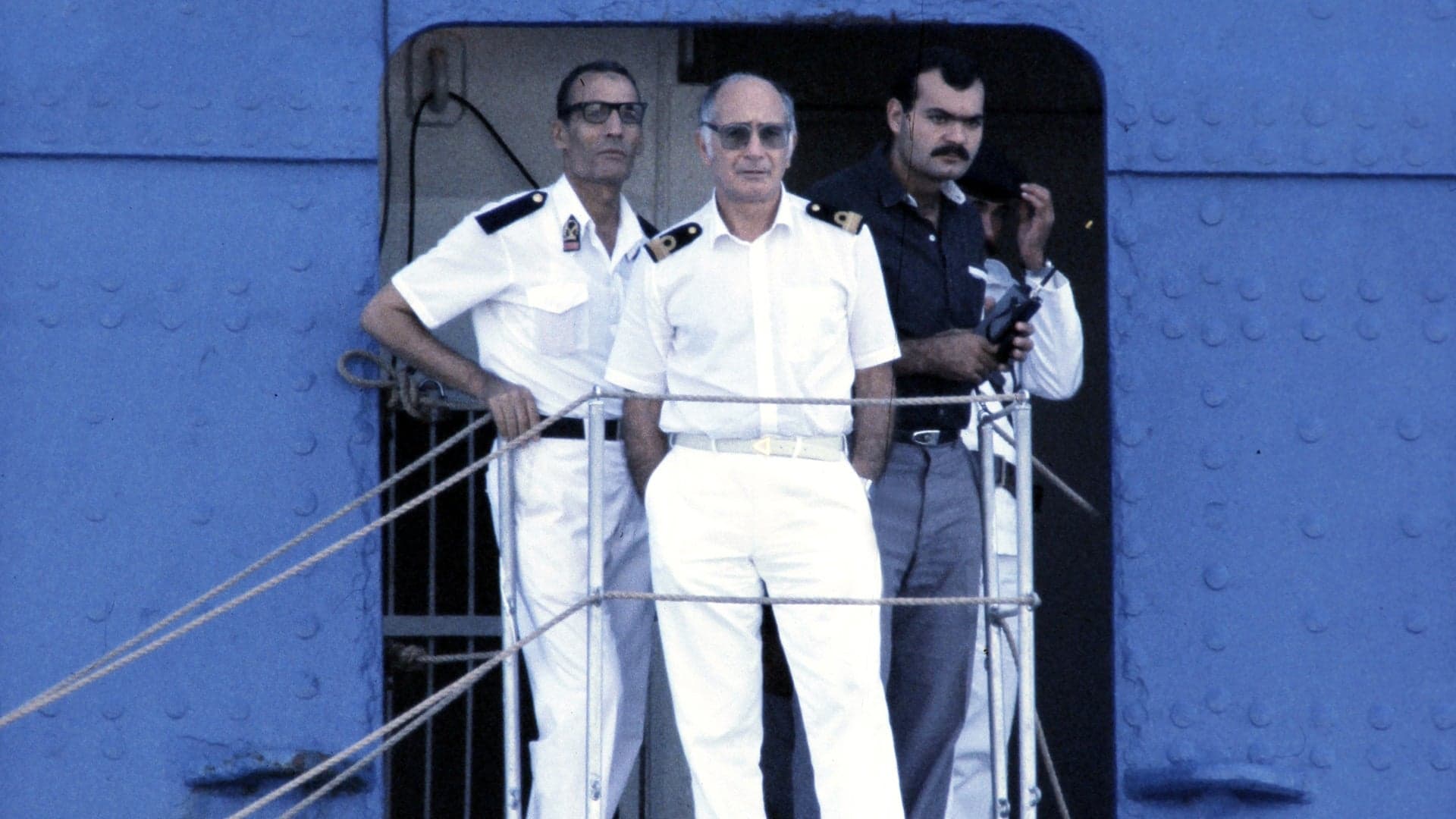
This Day in History Video: What Happened on October 10
Us naval academy opens, vice president agnew resigns, whitesnake’s “here i go again” tops the charts, us navy fighter jets intercept italian cruise ship hijackers.

Wake Up to This Day in History
Sign up now to learn about This Day in History straight from your inbox. Get all of today's events in just one email featuring a range of topics.
By submitting your information, you agree to receive emails from HISTORY and A+E Networks. You can opt out at any time. You must be 16 years or older and a resident of the United States.
More details : Privacy Notice | Terms of Use | Contact Us
Colonel George Custer’s funeral is held at West Point
“porgy and bess,” the first great american opera, premieres on broadway, superman christopher reeve dies at age 52, a former postal worker commits mass murder, president dwight d. eisenhower apologizes to african diplomat, william howe named commander in chief of british army, eight hundred children are gassed to death at auschwitz.
Umayyad Caliphate

Battle of Tours
From the caliphate's north-western African bases, a series of raids on coastal areas of the Visigothic Kingdom paved the way to the permanent occupation of most of Iberia by the Umayyads (starting in 711), and on into south-eastern Gaul (last stronghold at Narbonne in 759).
The Battle of Tours was fought on 10 October 732, and was an important battle during the Umayyad invasion of Gaul. It resulted in the victory for the Frankish and Aquitanian forces, led by Charles Martel, over the invading forces of the Umayyad Caliphate, led by Abdul Rahman Al-Ghafiqi, governor of al-Andalus.
Notably, the Frankish troops apparently fought without heavy cavalry. Al-Ghafiqi was killed in combat, and the Umayyad army withdrew after the battle. The battle helped lay the foundations of the Carolingian Empire and Frankish domination of western Europe for the next century.

What's New
New Features
Fixed/Updated
New HistoryMaps
We value your feedback. If you find any missing, misleading, or false information, please let us know. Please cite the specific story and event, briefly explain the issue, and (if possible) include your source(s). Also, if you encounter any content on our site you suspect might infringe copyright protections, do let us know. We are committed to respecting intellectual property rights and will promptly address any issues raised. Thank you.

IMAGES
VIDEO
COMMENTS
Battle of Tours as one of the decisive battles in the history of the world, claiming that it halted the Muslim advance into Europe and saved Western Christendom from Islamic conquest. Gibbon, Creasy, and many other famous historians subscribed to this point of view. In recent years, however, there has been a rising counter voice, with some ...
Escape Zeppelin said: Maybe, maybe not. As you pointed out, at that distance the Muslim forces were pretty much spent. The Franks can lose the battle but still win the war. Unless the Muslim forces crush the Franks I think another battle would be fought within a few years still leaving the Franks the victor just on a slightly delayed timescale.
The Battle of Tours (October 732), also called the Battle of Poitiers was a decisive Muslim victory during the Islamic invasion of Gaul, and was fought in an area between the cities of Poitiers and Tours, in north-central France, near the village of Moussais-la-Bataille, about 20 km (12 mi) northeast of Poitiers. The location of the battle was close to the border between the Frankish realm and ...
The second scenario is a less likely case where the Ummayyads annex the Aquitaine. This is even more catastrophic for the franks, where the loss of a big chunk of land creates even sooner the neustrian/austrasian wars, along with some burgundian secessionists. Charles Martel would outright be banished from political life if not executed ...
The Battle of Tours was most likely a raid. The Umayyads had enough trouble keeping together there empire in Iberia, which is why they never conquered the Kingdom of Asturias in the north. Not much would change I think. the muslim conquests of syria, egypt, persia, north africa, and andalusia also started as raids.
The Battle of Poitiers aka the Battle of Tours took place over roughly a week in early October of 732. The opposing sides consisted of a Frankish army led by Charles Martel (r. 718-741) against an invading Muslim army under the nominal sovereignty of the Umayyad Caliphate (c. 661-750) based in Damascus, Syria.. These two forces came together as Umayyad power sought expansion and plunder in ...
It is unlikely (but not impossible) for the Ummayads to expand further into France. Many of their invasions from the 632-732 period were with smallish armies that won surprising victories which also started as simple raids for loot. Tariq's invasion of Spain in 711 seems positively insane in retrospect, yet it succeeded and led to a 700-year ...
De Re Militari - The Battle of Tours-Poitiers Revisited (Apr. 05, 2024) Battle of Tours, (October 732), victory won by Charles Martel, the de facto ruler of the Frankish kingdoms, over Muslim invaders from Spain. The battlefield cannot be exactly located, but it was fought somewhere between Tours and Poitiers, in what is now west-central France.
The Battle of Tours, also called the Battle of Poitiers and the Battle of the Highway of the Martyrs, was fought on 10 October 732, and was one of the most important battles in human history. It was part of the Umayyad invasion of Gaul. It resulted in a victory by the Umayyads under Abdul Rahman Al Ghafiqi, the Governor-General of al-Andalus, over the Frankish and Aquitainian forces under ...
Rare are such conflicts that changed the history of the world with their importance and decided the future of us all for centuries to come. And one of those rare, world-changing battles is the Battle of Tours - fought in 732 AD between the Christian Frankish forces and the invading Muslim Umayyad Caliphate. This fierce and destructive conflict ...
The Battle of Tours, also called the Battle of Poitiers and the Battle of the Highway of the Martyrs (Arabic: معركة بلاط الشهداء, romanized: Maʿrakat Balāṭ ash-Shuhadā'), was fought on 10 October 732, and was an important battle during the Umayyad invasion of Gaul.It resulted in the victory for the Frankish and Aquitanian forces, led by Charles Martel, over the invading ...
01 Oct 2018. Charles Martel in the Battle of Tours. Painting by Charles de Steuben, 1837. Image Credit: Charles de Steuben, Public domain, via Wikimedia Commons. On 10 October 732 Frankish General Charles Martel crushed an invading Muslim army at Tours in France, decisively halting the Islamic advance into Europe.
The battle of Tours marks a major turning point in the history of Western Civilization. One where the spread of Islam into Europe was reversed, and Christianity begins to give the people of Europe something more in common with each other. By the year 1000 AD, the continent would be doing fairly well.
The Battle of Tours is unquestionably a noteworthy battle, but what exactly were its impacts om history. First, and most importantly, the Battle of Tours halted the spread of Islam into Western Europe. The Battle ended the First Umayyad invasion of modern-day France. The second invasion occurred from 735-739CE and arguably posed a greater threat.
Arabs, Franks, and the Battle of Tours, 732: ... The defeat of the Saracen invaders of Frankish lands at Tours (more properly Poitiers) in 732 A.D. was a turning point in history. It is not likely the Muslims, if victorious, would have penetrated, at least at once, far into the north, but they would surely have seized South Gaul, and thence ...
The Arabs conquer and rule the effectively independent Aquitaine. Aquitaine would be in the same cultural sphere as Al-Andalus. With large Jewish and Muslim communities ruling what is generally a Christian majority. Muslim Aquitaine is probably vassalised by Charlemagne at one point, but I can easily see it retaining it Muslim rulers despite that.
Commencing attacks against Aquitaine, they were checked at the Battle of Toulouse in 721. This saw Duke Odo defeat the Muslim invaders and kill Al-Samh. Retreating to Narbonne, Umayyad troops continued raiding west and north reached as far as Autun, Burgundy in 725. In 732, Umayyad forces led by the governor of Al-Andalus, Abdul Rahman Al ...
The battle of Tours, or Poitier, depending on the geographic point of view, fought in 732, was in a region between the Merovingian Frankish kingdom and the semi-independent duchy of Aquitaine. The battle took place between the Duke and Prince of the Franks, Charles Martel and a punitive expedition of the Umayyad Caliphate led by Abdul Raman Al ...
At the Battle of Tours near Poitiers, France, Frankish leader Charles Martel, a Christian, defeats a large army of Spanish Moors, halting the Muslim advance into Western Europe. Abd-ar-Rahman, the ...
In 732, Islamic forces invaded France in what they believed would be an easy victory. Instead they were beaten back by Charles the Hammer which allowed Chris...
The Battle of Tours was fought on 10 October 732, and was an important battle during the Umayyad invasion of Gaul. It resulted in the victory for the Frankish and Aquitanian forces, led by Charles Martel, over the invading forces of the Umayyad Caliphate, led by Abdul Rahman Al-Ghafiqi, governor of al-Andalus.